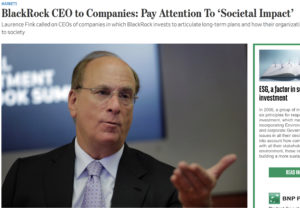Back in 1970, Milton Friedman helped to forge the current business paradigm by advising companies that profit maximisation and serving shareholders was what really mattered; and that by doing so, companies would be serving society too. After decades of myriad corporate scandals and ten years after the Global Financial Crash, Larry Fink, Blackrock’s CEO, has now joined a growing chorus of voices advising that this is no longer good enough. Instead, companies must manage and benefit all their key stakeholders. In his annual letter, Fink has now told CEO’s:
“Society is demanding that companies, both public and private, serve a social purpose. To prosper over time, every company must not only deliver financial performance, but also show how it makes a positive contribution to society. Companies must benefit all of their stakeholders, including shareholders, employees, customers, and the communities in which they operate.”
This is powerful rhetoric, especially coming from someone with Fink’s influence within the investment community. But does it provide good evidence that Friedman’s dominant philosophy is finally being eroded? Unfortunately, Fink’s words are open to interpretation. For some, Fink’s intervention means that profit maximisation is still acceptable provided it is coupled with strong corporate social responsibility or philanthropic activity. Such a “shared value” strategy is incoherent. For example, Nestle has been a prominent advocate of this approach but has struggled to reconcile and manage both societal and shareholder value. An OMINDEX downgrade on the company was issued in 2016 on the back of this incoherence and a research note issued to asset managers and pension funds advised that the company was missing 5-10% points on their operating margin. Nestle has been suboptimal for both shareholders and society and has since been under attack by an activist investor because of this. Interestingly, Fink appears to understand the dangers:
“Without a sense of purpose, no company, either public or private, can achieve its full potential. It will ultimately lose the license to operate from key stakeholders…It will remain exposed to activist campaigns that articulate a clearer goal, even if that goal serves only the shortest and narrowest of objectives. And ultimately, that company will provide subpar returns to the investors who depend on it to finance their retirement, home purchases, or higher education.”
This is insightful and investors should take note. The very best run companies have a clearly defined societal purpose that informs operational activity and aligns all human capital to this end. Our evidence is clear. Those that achieve this coherence and can reconcile shareholder return and societal benefit can competitively differentiate themselves, and do so for decades.
But…how can the investment community, Boards, and CEO’s work towards mutually inclusive goals that present a win for all stakeholders? Fink recognises that much work needs to be done by firms such as his, and the letter also pushes the question back to Boards and C-suites, asking for much better articulated long-term strategies. This is where Fink’s letter is of particular importance. To catalyse the change he is demanding, words are not enough: new common, global standards and instruments are needed – to diagnose, measure, and develop strategic ‘road maps’ to better manage value and risk for all stakeholders.
At MI, we have already developed unique, first-generation instruments and standards specifically to manage and analyse governance, culture and human value systems. These identify and determine the nature and extent of value creation, with specific reference across all stakeholder environments. Use of our OM30, OMINDEX and Total Stakeholder Value metric means that we have now reached a point where our work promotes a virtuous circle across investor, corporate and regulatory spheres and we can present compelling, dramatic evidence of the power of such an approach.
In the course of engaging with companies, one that has been recently rated called OMINDEX and its focus on maximising Total Stakeholder Value as “a race for the top”. We believe that this is exactly what all investors and boards want to create, and what Larry Fink is looking for too. For the first time, regulatory bodies are also using OMINDEX ratings to ask questions of how firms are being managed.
So, imagine a race to maximise Total Stakeholder Value (TSV) rather than short-term profitability. A 50-year shareholder, profit based paradigm can then be replaced by something far more powerful, sustainable and mutually beneficial for all.
For more information on how you can play your part in creating a TSV paradigm please contact stuart.woollard@omservices.org


Comments are closed